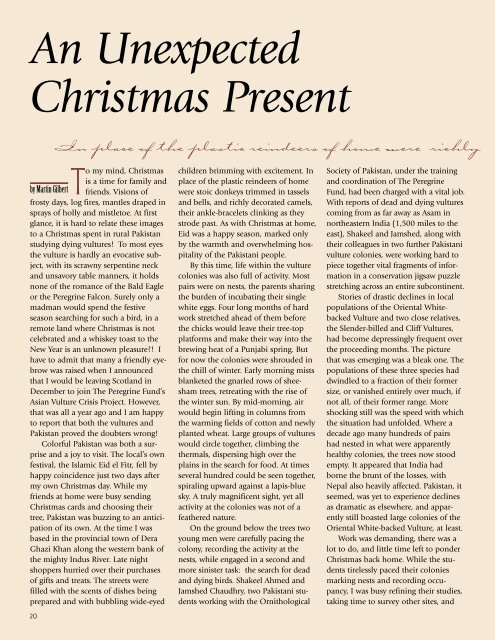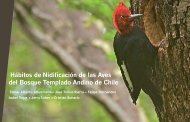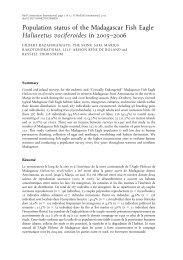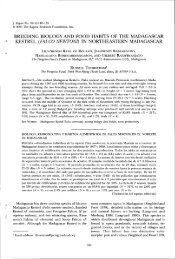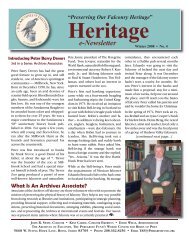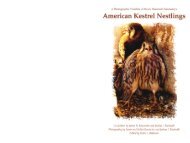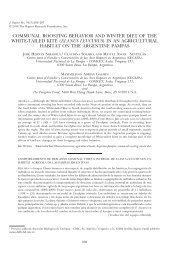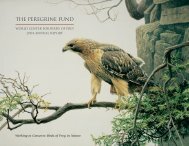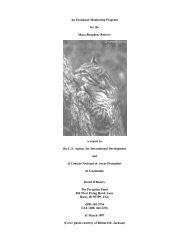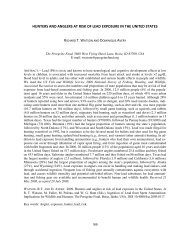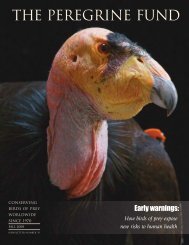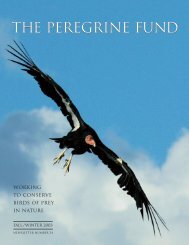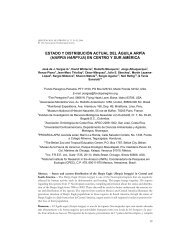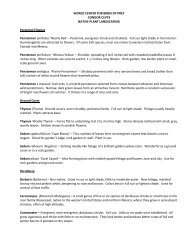2001 Newsletter - The Peregrine Fund
2001 Newsletter - The Peregrine Fund
2001 Newsletter - The Peregrine Fund
Create successful ePaper yourself
Turn your PDF publications into a flip-book with our unique Google optimized e-Paper software.
An Unexpected<br />
Christmas Present<br />
In place of the plastic reindeers of home were richly<br />
To my mind, Christmas<br />
is a time for family and<br />
by Martin Gilbert friends. Visions of<br />
frosty days, log fires, mantles draped in<br />
sprays of holly and mistletoe. At first<br />
glance, it is hard to relate these images<br />
to a Christmas spent in rural Pakistan<br />
studying dying vultures! To most eyes<br />
the vulture is hardly an evocative subject,<br />
with its scrawny serpentine neck<br />
and unsavory table manners, it holds<br />
none of the romance of the Bald Eagle<br />
or the <strong>Peregrine</strong> Falcon. Surely only a<br />
madman would spend the festive<br />
season searching for such a bird, in a<br />
remote land where Christmas is not<br />
celebrated and a whiskey toast to the<br />
New Year is an unknown pleasure?! I<br />
have to admit that many a friendly eyebrow<br />
was raised when I announced<br />
that I would be leaving Scotland in<br />
December to join <strong>The</strong> <strong>Peregrine</strong> <strong>Fund</strong>’s<br />
Asian Vulture Crisis Project. However,<br />
that was all a year ago and I am happy<br />
to report that both the vultures and<br />
Pakistan proved the doubters wrong!<br />
Colorful Pakistan was both a surprise<br />
and a joy to visit. <strong>The</strong> local’s own<br />
festival, the Islamic Eid el Fitr, fell by<br />
happy coincidence just two days after<br />
my own Christmas day. While my<br />
friends at home were busy sending<br />
Christmas cards and choosing their<br />
tree, Pakistan was buzzing to an anticipation<br />
of its own. At the time I was<br />
based in the provincial town of Dera<br />
Ghazi Khan along the western bank of<br />
the mighty Indus River. Late night<br />
shoppers hurried over their purchases<br />
of gifts and treats. <strong>The</strong> streets were<br />
filled with the scents of dishes being<br />
prepared and with bubbling wide-eyed<br />
20<br />
children brimming with excitement. In<br />
place of the plastic reindeers of home<br />
were stoic donkeys trimmed in tassels<br />
and bells, and richly decorated camels,<br />
their ankle-bracelets clinking as they<br />
strode past. As with Christmas at home,<br />
Eid was a happy season, marked only<br />
by the warmth and overwhelming hospitality<br />
of the Pakistani people.<br />
By this time, life within the vulture<br />
colonies was also full of activity. Most<br />
pairs were on nests, the parents sharing<br />
the burden of incubating their single<br />
white eggs. Four long months of hard<br />
work stretched ahead of them before<br />
the chicks would leave their tree-top<br />
platforms and make their way into the<br />
brewing heat of a Punjabi spring. But<br />
for now the colonies were shrouded in<br />
the chill of winter. Early morning mists<br />
blanketed the gnarled rows of sheesham<br />
trees, retreating with the rise of<br />
the winter sun. By mid-morning, air<br />
would begin lifting in columns from<br />
the warming fields of cotton and newly<br />
planted wheat. Large groups of vultures<br />
would circle together, climbing the<br />
thermals, dispersing high over the<br />
plains in the search for food. At times<br />
several hundred could be seen together,<br />
spiraling upward against a lapis-blue<br />
sky. A truly magnificent sight, yet all<br />
activity at the colonies was not of a<br />
feathered nature.<br />
On the ground below the trees two<br />
young men were carefully pacing the<br />
colony, recording the activity at the<br />
nests, while engaged in a second and<br />
more sinister task: the search for dead<br />
and dying birds. Shakeel Ahmed and<br />
Jamshed Chaudhry, two Pakistani students<br />
working with the Ornithological<br />
Society of Pakistan, under the training<br />
and coordination of <strong>The</strong> <strong>Peregrine</strong><br />
<strong>Fund</strong>, had been charged with a vital job.<br />
With reports of dead and dying vultures<br />
coming from as far away as Asam in<br />
northeastern India (1,500 miles to the<br />
east), Shakeel and Jamshed, along with<br />
their colleagues in two further Pakistani<br />
vulture colonies, were working hard to<br />
piece together vital fragments of information<br />
in a conservation jigsaw puzzle<br />
stretching across an entire subcontinent.<br />
Stories of drastic declines in local<br />
populations of the Oriental Whitebacked<br />
Vulture and two close relatives,<br />
the Slender-billed and Cliff Vultures,<br />
had become depressingly frequent over<br />
the proceeding months. <strong>The</strong> picture<br />
that was emerging was a bleak one. <strong>The</strong><br />
populations of these three species had<br />
dwindled to a fraction of their former<br />
size, or vanished entirely over much, if<br />
not all, of their former range. More<br />
shocking still was the speed with which<br />
the situation had unfolded. Where a<br />
decade ago many hundreds of pairs<br />
had nested in what were apparently<br />
healthy colonies, the trees now stood<br />
empty. It appeared that India had<br />
borne the brunt of the losses, with<br />
Nepal also heavily affected. Pakistan, it<br />
seemed, was yet to experience declines<br />
as dramatic as elsewhere, and apparently<br />
still boasted large colonies of the<br />
Oriental White-backed Vulture, at least.<br />
Work was demanding, there was a<br />
lot to do, and little time left to ponder<br />
Christmas back home. While the students<br />
tirelessly paced their colonies<br />
marking nests and recording occupancy,<br />
I was busy refining their studies,<br />
taking time to survey other sites, and


